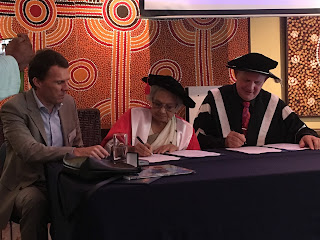Earlier this week in Cairns, I unveiled an ambitious $54.7m CBD campus funding proposal designed to stimulate new industries in the North and generate maximum community impact. CQUniversity has spent the last few years engaging with our community and industry leaders in Cairns about the role we can play in kick-starting new industries, skilling emerging workforces and diversifying the local economy. The Cairns community made it clear that they look to us to take a proactive lead in unlocking a range of emerging industries through our engagement, research and unique workforce skilling. What I announced today is a blueprint to implement the community’s vision for Cairns – the exciting new industries and opportunities that will make this region far more resilient and prosperous.
While the funding request is ambitious, the economic multiplier effect of this blueprint will continue paying out for generations to come. The $54.7m CQUniversity Cairns Community Impact Plan comprises five new industry kick-starter projects centred around a much larger, permanent campus base capable of accommodating more than 2,500 local and international students in the heart of the CBD. The new campus will cement CQUniversity’s rapidly-growing presence in the CBD permanently, securing Cairns’ identity as a multiple-university city. The much larger campus will also allow for further growth and investment by CQUniversity, with its current campus having reached capacity.
In addition to the permanent and expanded CBD campus, the $54.7m CQUniversity Cairns Community Impact Plan also includes strategic projects designed to launch the emerging local industries of Aviation Engineering and Pilot Training; High Performance Sports Science; Indigenous Policy Formulation; Indigenous Health and Education; Emerging Tourism and Economic Development; and Creative and Performing Arts enterprises.
I am confident Cairns will get behind CQUniversity’s ambitious blueprint for community impact, because it was the community who told us what it should look like. CQUniversity came to Cairns quite modestly back in 2012, but our philosophy of engaging with the community and its industries on all our big decisions saw our student numbers almost triple in a no time at all, with our staff numbers now exceeding 140, and no room left on our current campus for more growth. So the University has this immense trust in the community when they tell us what will and won’t work. The community has essentially given us a blueprint for where they see Cairns in 15 years, and asked us how we can deliver on it for them. I have absolute faith in their vision, and in our ability to deliver.
I encourage everyone to learn more about our $54.7m CQUniversity Cairns Community Impact Plan by visiting www.cqu.edu.au/cairnsimpactplan









